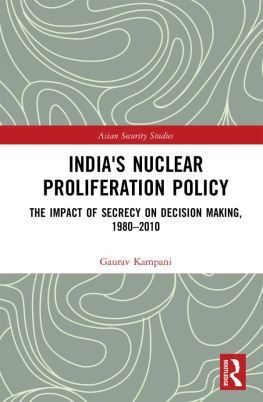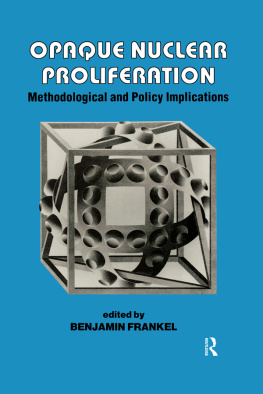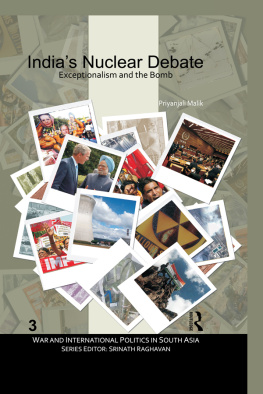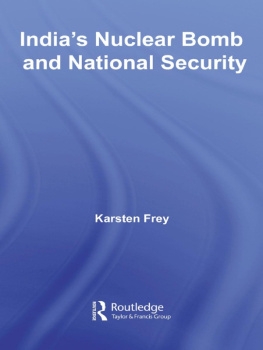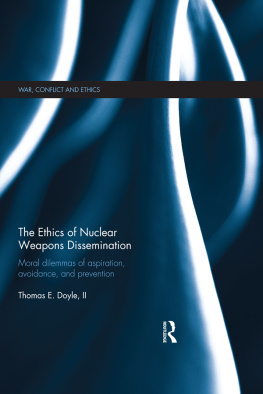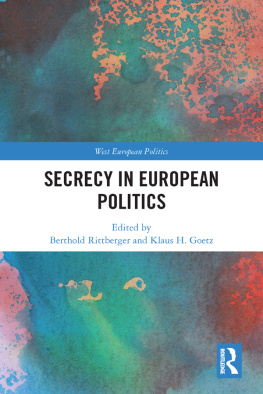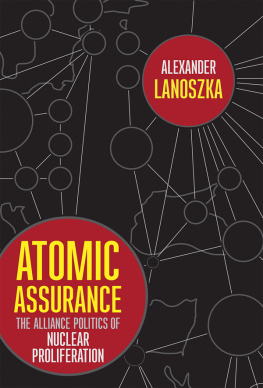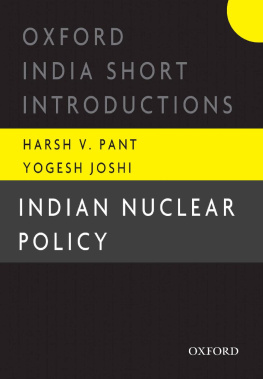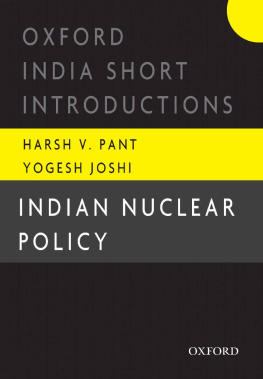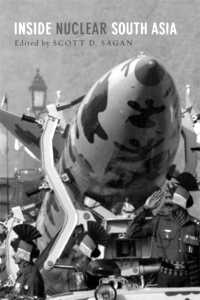Indias Nuclear Proliferation Policy
This book examines Indias nuclear program, and it shows how secrecy inhibits learning in states and corrodes the capacity of decision-makers to generate optimal policy choices.
Focusing on clandestine Indian nuclear proliferation during 19802010, the book argues that efficient decision-making is dependent on strongly established knowledge actors, high information turnover and the capacity of leaders to effectively monitor their agents. When secrecy concerns prevent states from institutionalizing these processes, leaders tend to rely more on heuristics and less on rational thought processes in choices involving matters of great political uncertainty and technical complexity. Conversely, decision-making improves as secrecy declines and policy choices become subject to higher levels of scrutiny and contestation. The arguments in this book draw on compelling evidence gathered from interviews conducted by the author, with interviewees including individuals who were involved in nuclear planning in India from 1980 to 2010, such as former cabinet and defence secretaries, the principal secretary to the prime minister, national security advisors, secretaries to the department of atomic energy, military chiefs of staff and their principal staff officers, and commanders of Indias strategic (nuclear) forces.
This book will be of much interest to students of nuclear proliferation, Asian politics, strategic studies and International Relations.
Gaurav Kampani is Assistant Professor of Political Science at the University of Tulsa, USA.
Asian Security Studies
Series Editors:
Sumit Ganguly, Indiana University, Bloomington
Andrew Scobell, Research and Development (RAND) Corporation, Santa Monica
Joseph Chinyong Liow, Nanyang Technological University, Singapore
Few regions of the world are fraught with as many security questions as Asia. Within this region it is possible to study great power rivalries, irredentist conflicts, nuclear and ballistic missile proliferation, secessionist movements, ethnoreligious conflicts and inter-state wars. This book series publishes the best possible scholarship on the security issues affecting the region, and includes detailed empirical studies, theoretically oriented case studies and policy-relevant analyses as well as more general works.
Indonesias Foreign Policy and Grand Strategy in the 21st Century
Rise of an Indo-Pacific Power
Vibhanshu Shekhar
Hizbut Tahrir Indonesia and Political Islam
Identity, Ideology and Religio-Political Mobilization
Mohamed Nawab Mohamed Osman
China and International Nuclear Weapons Proliferation
Strategic Assistance
Henrik Stlhane Hiim
Reshaping the Chinese Military
The PLAs Roles and Missions in the Xi Jinping Era
Edited by Richard A. Bitzinger and James Char
Indias Nuclear Proliferation Policy
The Impact of Secrecy on Decision Making, 19802010
Gaurav Kampani
For more information about this series, please visit:
www.routledge.com/Asian-Security-Studies/book-series/ASS
First published 2020
by Routledge
2 Park Square, Milton Park, Abingdon, Oxon OX14 4RN
and by Routledge
52 Vanderbilt Avenue, New York, NY 10017
Routledge is an imprint of the Taylor & Francis Group, an informa business
2020 Gaurav Kampani
The right of Gaurav Kampani to be identified as author of this work has been asserted by him in accordance with sections 77 and 78 of the Copyright, Designs and Patents Act 1988.
All rights reserved. No part of this book may be reprinted or reproduced or utilised in any form or by any electronic, mechanical, or other means, now known or hereafter invented, including photocopying and recording, or in any information storage or retrieval system, without permission in writing from the publishers.
Trademark notice: Product or corporate names may be trademarks or registered trademarks, and are used only for identification and explanation without intent to infringe.
British Library Cataloguing-in-Publication Data
A catalogue record for this book is available from the British Library
Library of Congress Cataloging-in-Publication Data
Names: Kampani, Gaurav, 1969- author.
Title: Indias nuclear proliferation policy : the impact of secrecy on decision making, 1980-2010 / Gaurav Kampani.
Other titles: Impact of secrecy on decision making, 1980-2010
Description: New York, NY : Routledge, 2020. | Series: Asian security studies | Includes bibliographical references and index.
Identifiers: LCCN 2019030655 (print) | LCCN 2019030656 (ebook) | ISBN 9780367356286 (hardback) | ISBN 9780429340734 (ebook)
Subjects: LCSH: Nuclear weapons--India. | India--Military policy.
Classification: LCC UA840 .K245 2020 (print) | LCC UA840 (ebook) | DDC 327.1/747095409045--dc23
LC record available at https://lccn.loc.gov/2019030655
LC ebook record available at https://lccn.loc.gov/2019030656
ISBN: 978-0-367-35628-6 (hbk)
ISBN: 978-0-429-34073-4 (ebk)
Typeset in Times New Roman
by SPi Technologies India Private Limited
Books are long in the making and mine is no different. Ten years have passed from the time when I first started developing ideas that have become a part of this work. Before starting graduate school, I had a relatively benign notion of what it took to produce a work of this scale and magnitude. But after a 10-year slog, I have turned sensitive and appreciative of data, evidence and what it takes to construct an original argument. As my advisor Peter Katzenstein once wryly remarked: graduate students are a perpetually dissatisfied lot in the classroom except when it is time for them to produce their own work.
This book is my intellectual work. Yet it is a collective endeavor involving many. I owe primary thanks to my dissertation committee members: Peter Katzenstein, Matthew Evangelista, Christopher Way and Sumit Ganguly. In a sense, Peter Katzenstein is the architect of this project. It was Peter who pushed me on a field trip to India to try and collect data, which until then I had thought was impossible to obtain. When external funders declined to fund my research citing precisely those data concerns, Peter found money internally within Cornell, without my active knowledge of what it took for him to do so. When I despaired that my data might not add up, he reminded me that research was a quest for what might exist, not what we suppose exists. Through all these years, he has been unwavering in his intellectual and emotional support, answering every email I wrote him, returning chapter drafts in record time and providing feedback that was exquisite in its attention for detail. The treatment I received from him is probably no different from that received by dozens of students he has shepherded over the years. Through him I learnt the institutional significance of having a first-rate academic advisor in graduate school.
All committee members were remarkably generous with their support, time and attention. In the starting phases of the project Matt Evangelista as the director of the Judith Reppy Institute for Peace and Conflict Studies was instrumental in providing me seed money to get my research off the ground. I owe him special thanks for his magical ability to conjure up literature that spoke to my research, to scrutinize my arguments with meticulous care for inconsistencies and flaws, and for catching every typo and spelling mistake in my writing. Whenever I ran into an ice field that threatened to trap the vessel of my arguments, Matt helped me find a way that in retrospect seemed obvious. Chris Way played the bad cop on the committee subjecting my arguments to withering criticism, which to an observer unschooled in the traditions of academe might even appear hostile. However, Chriss criticisms were directed with the best intellectual intentions. They cut through the background noise and identified with precision what was valuable, unique and how what was useful could benefit from further amplification. From him I learnt the art of executing what I had heard before but not understood fully: that arrived simplicity is truly the greatest form of complexity. Finally, I owe thanks to Sumit Ganguly, who graciously sat as an external member on my committee. It was Sumit who performed the prodigious task of vetting the complex historical data that is central to my argument. Eagle eyed in spotting anomalies, Sumit was unrelenting when he differed. Yet, he was gracious in finding ways to bridge intellectual disagreements and generous in accepting new arguments when supported by data. More significant, Sumit later played an instrumental role in helping me with the publication process.

